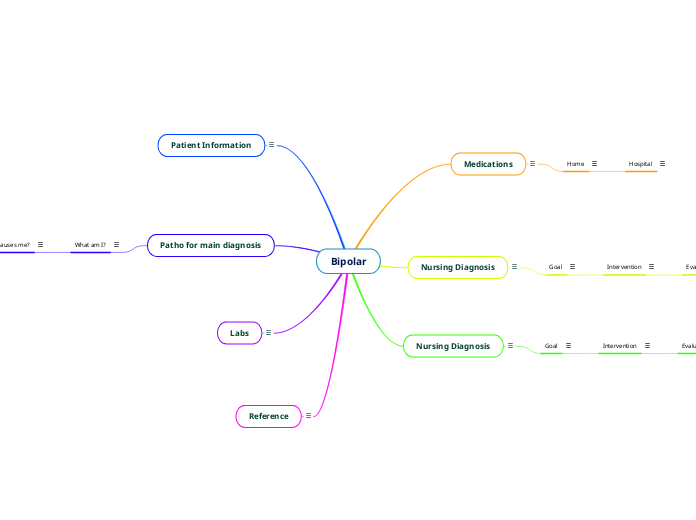作者:Erin Radons 2 年以前
186
Bipolar
A 25-year-old individual with a history of bipolar disorder was brought to the emergency department by law enforcement due to erratic behavior and past instances of suicidal ideation and self-harm.

作者:Erin Radons 2 年以前
186

更多类似内容
Pollard, C. L., Jakubec, S. L., & Halter, M. J. (2018). Bipolar and Related Disorders . In Varcarolis's
Canadian Psychiatric Mental Health Nursing: A clinical approach (8th ed., pp. 222–241). essay, Saunders Canada.
What am I?
Bipolar disease, or bipolar 2 disorder is a condition in which a patient experiences at least one hypomanic episode (low-level and less dramatic mania) and at least one major depressive episode.
What causes me?
Certain drugs such as cocaine and genetics. Norepinephrine, dopamine, and serotonin all play a role in bipolar disorder. An overabundance will bring mania and too few will bring depression.
S/S?
Signs and Symptoms?
Fast speech, poor hygiene, clothing unclean, illogical thinking and behavioral patterns, insomnia, inflated self-esteem, grandiosity, flight of ideas, distractibility, excessive involvement in activities that have a high potential for painful consequences, mood disturbance, altered thought processes, minimal calorie intake due to poor appetite, loud and crass speech, and dysfunctional interaction with others.
Age: 25
DOB:3/27/1997
Reason for visit: Brought to the ED by the police department due to erratic behavior.
Has had past suicidal ideation with self harm.
Nursing Diagnosis:
Self-Care Deficit
Goal/Outcome:
The patient will complete 2 full meals (dinner and breakfast), shower, and have clean clothing by the end of the hospital stay.
Goal Partially Met:
Patient ate at both dinner and breakfast time, but did not complete all of the food at dinner. The patient stated that he wasn't very hungry and that he did not need to finish because he didn't need food to feel good. In the morning the patient did eat all of his food before he was discharged.
Nursing Diagnosis:
Sleep Deprivation
Goal/Outcome:
The patient is able to sleep for 4-6 hours during the hospital visit and reports feeling well rested upon waking up.
Evaluation
Goal Partially Met:
Patient was able to sleep for 4 and a half hours, but the patient stated that he did not feel well rested and that he never needed the sleep in the first place.
Medications that can be given for bipolar patients:
Anticonvulsant drugs such as valproate can help prevent future manic episodes.
Lurasidone (Latuda) and quetiapine (Seroquel) are also FDA approved drugs to help treat bipolar disease.
No medications taken at home recently. The last remembered medication was taken 3 years prior. The patient stated that he did not remember the exact medication that was taken at the time but stated that it was an antidepressant.
No medications taken or given at the hospital. No medications were indicated to be given by the orders or the mar.